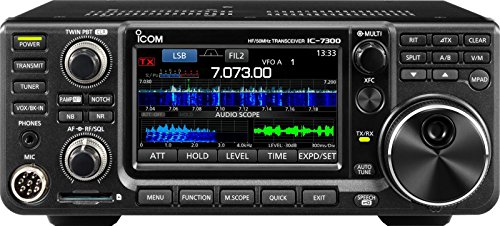When it comes to amateur radio equipment, Yaesu and Icom are two of the most respected and recognized brands in the market. Both companies have a long history of producing high-quality transceivers and accessories that cater to the needs of amateur radio operators worldwide.
🏷️ Yaesu Radio Deals (Up to 10% Off) ⭐⭐⭐⭐⭐
This article will explore the key differences and similarities between Yaesu and Icom, helping you decide which brand might be best suited for your needs.
Product Range
Both Yaesu and Icom offer a wide range of products catering to different segments of the amateur radio community, including HF, VHF, and UHF transceivers, handheld radios, and more.
Yaesu’s Key Products
- HF Transceivers: Yaesu is renowned for its high-frequency (HF) transceivers like the FT-991A and the FT-DX101D. These models are popular among amateur radio enthusiasts for their exceptional performance and features like advanced digital signal processing (DSP) and robust build quality.
- VHF/UHF Radios: The FT-2980R and the FT-4XR are examples of Yaesu’s reliable and powerful VHF/UHF radios. These devices are favored for their excellent audio quality and rugged design.
🏷️ Yaesu Radio Deals (Up to 10% Off) ⭐⭐⭐⭐⭐
- Handheld Radios: Yaesu’s FT-3DR and FT-70DR are popular choices for handheld radios. They offer a range of features including digital modes, wide-band receive, and user-friendly interfaces.
- Digital Modes: Yaesu’s System Fusion technology is a standout feature in their digital products, providing seamless communication between analog and digital users.
Icom’s Key Products
- HF Transceivers: Icom’s IC-7300 and IC-7610 are among the most popular HF transceivers in the market. These radios are known for their intuitive touchscreen interfaces, superior DSP, and excellent receiver performance.
- VHF/UHF Radios: The IC-9700 and IC-2730A are examples of Icom’s offerings in the VHF/UHF segment. They are praised for their robust performance and advanced features.
- Handheld Radios: Icom’s IC-705 and ID-52A are standout handheld models that offer versatility and advanced features like GPS, D-STAR digital voice, and wideband reception.
- Digital Modes: Icom’s D-STAR technology is widely used and offers robust digital communication capabilities, making it a preferred choice for many digital enthusiasts.
Key Features Comparison
When choosing between Yaesu and Icom, several key features should be considered:
Build Quality and Durability
- Yaesu: Known for its rugged construction, Yaesu radios are often designed to withstand harsh conditions, making them ideal for field use.
- Icom: Icom radios also feature high build quality, often with a focus on sleek design and ease of use.
User Interface
- Yaesu: Generally offers a traditional interface with numerous physical controls, which can be easier to use in tough conditions or with gloves.
- Icom: Often incorporates modern touchscreens and intuitive interfaces, providing a more contemporary user experience.
Innovation and Technology
- Yaesu: Pioneered System Fusion, which allows seamless communication between digital and analog signals. They also emphasize robust, all-mode communication.
- Icom: Known for introducing D-STAR, a digital voice and data protocol that has become very popular among amateur radio operators. Icom is also ahead in SDR (Software Defined Radio) technology with products like the IC-7300.
Audio Quality
- Yaesu: Offers excellent audio quality, particularly favored in their HF transceivers and handheld radios.
- Icom: Also provides superior audio clarity, with a slight edge in some of their advanced models due to sophisticated DSP technology.
Community and Support
- Yaesu: Has a loyal user base with extensive community support and numerous forums and clubs dedicated to Yaesu products.
- Icom: Also enjoys strong community support with a significant presence in amateur radio societies and extensive online resources.
Pricing and Value
- Yaesu: Tends to offer competitive pricing across its product range. They provide robust features and reliability at a price point that appeals to many amateur radio operators.
- Icom: While often slightly higher priced, Icom radios justify their cost with advanced technology, superior design, and feature-rich packages.
Summary
Choosing between Yaesu and Icom ultimately depends on your specific needs and preferences.
- Yaesu is ideal if you value rugged construction, traditional interfaces, and excellent analog performance.
- Icom is the go-to choice if you prefer modern interfaces, advanced digital capabilities, and cutting-edge technology.
Both brands offer outstanding products, and your decision should be guided by features and how you intend to use the radio. Whether you are an experienced operator or a newcomer to the world of amateur radio, both Yaesu and Icom provide reliable and innovative solutions to meet your communication needs.
References
🏷️ Yaesu Radio Deals (Up to 10% Off) ⭐⭐⭐⭐⭐













